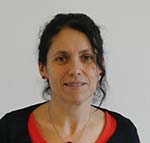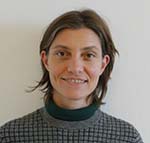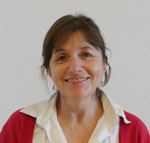Professors
Bartolami Sylvain
 |
PhD, Associate Professor, University of Montpellier Contact: sylvain.bartolami(at)univ-montp2.fr / sylvain.bartolami(at)umontpellier.fr Group 2: Cellular determinants of neuroprotection |
Presentation
After a bachelor in animal physiology (University Grenoble I), I moved to Brighton and took part in a research project studying the development of the chick inner ear (University of Sussex, Prof. Richardson’s Lab). Then, I undertook a master degree in Biochemistry Molecular and Cellular Biology (University Montpellier 2) followed by a PhD degree (Prof. Pujol’s Lab, University Montpellier 2). The subject of my thesis was the characterisation of the muscarinic innervation in the cochlea. My postdoc was carried out at the University of Michigan (Prof. Schacht’s Lab) where I studied the motile behaviour of the auditory cells. Back to France , I jointed a team involved in the neurobiology of balance disorders (Prof Sans and Dr Chabbert, University Montpellier 2 and Montpellier Institute of Neurosciences) and started, amongst others, researches on the physiology of transitional cells of the vestibular neuroepithelium and on the proliferative properties of the vestibular Schwann cells. In the past years, I kept on working in the glial cell field and got involved in the study of the molecular mechanisms underlying the myelinisation of peripheral nerves by Schwann cells (Dr Tricaud’s team, Montpellier Institute of Neurosciences). At present, the Profs Perrin and Verdier (University of Montpellier, MMDN Lab) proved me with the opportunity to start a new challenge: understanding the glial cell responses following spinal cord injury. Our goal is to determine conditions that will favour neuroregeneration in lesioned spinal cord. (List of publications is given in the curriculum vitae file)
Lasbleiz Christelle
 |
Lecturer EPHE Contact: christelle.lasbleiz(at)umontpellier.fr Phone: 04 67 14 93 47 Group 1: Metabolic impacts in tauopathies |
Lebart Marie-Christine
 |
Lecturer EPHE Contact: marie-christine.lebart(at)umontpellier.fr Phone: 04 67 14 39 89 Group 1: Metabolic impacts in tauopathies |
Lonjon Nicolas
 |
PUPH Contact: n-lonjon(at)chu-montpellier.fr Group 3: Integrative biology of neuroregeneration |
Marcilhac Anne
 |
Lecturer EPHE Contact: marcilhac(at)univ-montp2.fr Phone: 04 67 14 48 30 Group 1: Metabolic impacts in tauopathies |
Marelli Cécilia
 |
PH CHU Contact: c-marelli(at)chu-montpellier.fr Phone: 33 (0)4 67 14 42 70 (Florence Maschat' Units, U1198) / 33(0)4 67 33 60 29 (secretariat CHU, Département de neurologie) Group 2: Cellular determinants of neuroprotection |
Presentation
Cecilia Marelli has been working as Neurologist in the Neurology Department at the Gui de Chauliac University Hospital of Montpellier since October 2010. She is actually completing a PhD degree on P42, a peptide active against Huntington’s disease, under the direction of Florence Maschat (U1198- MMDN)
She completed her residency in neurology at the Istituto Neurologico Besta in Milan (Italy) (in the team "Movement Disorders", directed by the Professor A. Albanese), followed by a one-year fellowship in the same Institute (in the team directed by the Dr D. Pareyson) and by a two –year fellowship in the Genetic Department of the Pitie-Salpetriere Hospital in Paris (in the team Directed by the Professor A. Durr and the Professor A. Brice).
She is mainly interested in the genetic and metabolic aspects of neurodegenerative diseases, notably Huntington’s disease, cerebellar ataxias, spastic paraplegias, and dementias.
Mestre-Francès Nadine
 |
Study Director EPHE Contact: nfrances(at)univ-montp2.fr Phone: 04 67 14 42 52 Group 1: Metabolic impacts in tauopathies |
PRESENTATION
Nadine Mestre-Frances is an assistant professor at Ecole Pratique des Hautes Etudes. She teachs neuroscience and animal experimentation. She is co-responsible for the team “Cerebral aging and neurodegenerative diseases” in the unit INSERM U1198-EPHE-UM. She studies the Cerebral aging and neurodegenerative diseases such as prion, Alzheimer and Parkinson disease in a non human primate, the gray mouse lemur. The development of this model was supported by various fundings: US Alzheimer organization, France Alzheimer, National Institutes of Health, European Program FP7, GIS Prion, ANR e-rare. Head director of the platform animals models at the Montpellier University (CECEMA, www.cecemaa3l3.univ-montp2.fr)
Perrin Florence
 |
Professor, University of Montpellier Membre de l'Institut Universitaire de FranceContact: florence.perrin(at)umontpellier.fr Group 3: Integrative biology of neuroregeneration |
Poulen Gaétan
 |
Clinicien Attaché, PHU Contact: gpoulen(at)chu-montpellier.fr Group 3: Integrative biology of neuroregeneration |
Rossel Mireille
 |
Assistant Professor EPHE Contact: mireille.rossel(at)umontpellier.fr / mireille.rossel(at)ephe.sorbonne.fr Phone: 04 67 14 38 15 Team: ZeNeuro zebrafish platform, Phenotyping platform ZebraSens Group 2: Cellular determinants of neuroprotection |
Presentation
After a PhD at the Claude Bernard Lyon1 University, I was interested in pathologies linked to neural crest cells (M. Billaud CNRS lab, Lyon 1993-1995) and then I pursued my research on the early development of the nervous system and its regulation by the Hox genes (M. Capecchi, HHMI, Utah, US, 1995-1999). Recruited at the Ecole Pratique des Hautes Etudes in 2001, my projects focused on the vertebrate nervous system development, and more particularly on factors that regulate neuronal progenitor migrations. In order to analyze the roles of Reelin and CXCL12 chemokine (and its receptors CXCR4/CXCR7), I developed models to study neuronal migration at the level of the hindbrain and neocortex in mice and zebrafish. My current projects aim at identifying the early events involved in the neurotoxicity through zebrafish models.
Scientific event organization: I co-organize the Zebrafish Club, which gather the Montpellier zebrafish community two or three times per year.
I also fulfill administrative functions at the EPHE: I am a member of the Teaching Board (2012-present) and a member of the Executive Board of the Section of Life Sciences and Earth (2014-present).
Trousse Françoise
 |
Lecturer EPHE Contact: francoise.trousse(at)umontpellier.fr / francoise.trousse(at)ephe.sorbonne.fr Phone: 04 67 14 48 30 Group 1: Metabolic impacts in tauopathies Collaborations:
|
Presentation
My research has focused on the development of the nervous system and particularly the role of morphogens in the induction of oligodendrocytes in the chicken neural tube (Ph.D., University Paul Sabatier, P. Cochard, Toulouse, 1998) and in the specification and differentiation vertebrate eye (post-doc, P. Bovolenta, Instituto Cajal-CSIC, Madrid, 1998-2002). Back in Toulouse for a second post-doc (CBD-CNRS, C. Soula, 2003-2006), I studied the function of Glial cell missing gene (Gcm) during vertebrate neurogenesis. In January 2007, I was hired as an Assistant professor at the EPHE, laboratory MMDN. My line of research has focused on the developmental function of an inflammatory protein, Regenerating Islet-1 derived (Reg-1a) expressed early in the central nervous system and found as aggregates in the brain of patients with Alzheimer's disease. Currently my research theme seeks to understand the implication of Reg-1a in neurodegenerative process-related tauopathies from transgenic and cell models.
Verdier Jean-Michel
 |
MMDN Director, Study Director EPHE Contact: jean-michel.verdier(at)umontpellier.fr Phone: 04 67 14 32 91 Group 1: Metabolic impacts in tauopathies |
Presentation
Biochemist and neurobiologist, J.M. Verdier is a Professor at the École Pratique des Hautes Études (EPHE, Sorbonne, Paris). He leads the lab "Molecular Mechanisms in Neurodegenerative Diseases" (MMDN) of the french National Institute of Health in Montpellier, dedicated to research on the biology of ageing and of neurodegenerative diseases, from cells to humans.
Pr. Verdier’s interests include the development of primate models of neurodegenerative diseases such as Alzheimer and Parkinson diseases, and protein fibril formation in neurodegenerative diseases for which he was awarded the National Academy of Medicine award in 2005.